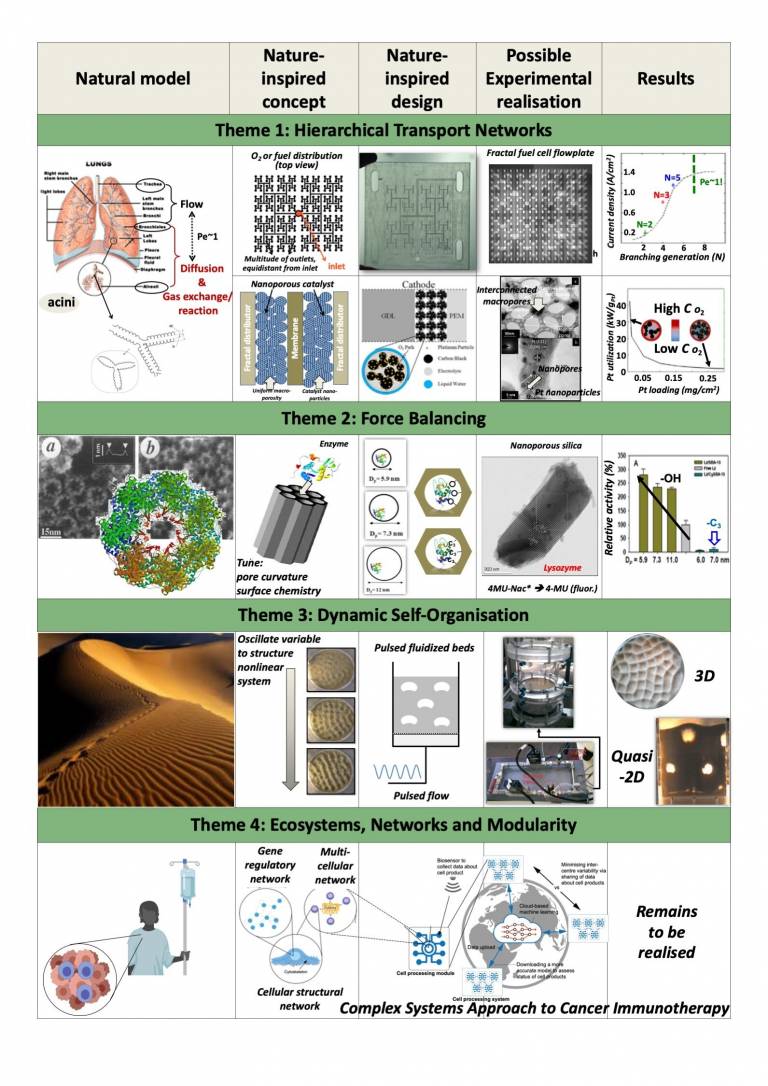Evolution over the eons has made nature a treasure trove of clever solutions to sustainability, resilience, and ways to efficiently utilise scarce resources.
The Centre for Nature Inspired Engineering at UCL draws lessons from nature to engineer innovative solutions to our grand challenges in energy, water, materials, health, and living space.
Rather than imitating nature out of context or succumbing to superficial analogies, research at the Centre is taking a decidedly scientific approach to uncover fundamental mechanisms underlying desirable traits, and apply these mechanisms to design and synthesise artificial systems that hereby borrow the traits of the natural model.
These systems – desalination membranes, fuel cells, catalysts, adaptive materials, or built environments – thus become endowed with the same desirable characteristic as their models in nature – cell membranes, lungs, trees and bacterial communities – with associated extraordinary performance, such as scalability, robustness, material and energy efficiency.
Over the years, the CNIE has developed, validated (by means of flagship projects) and applied (often in collaboration with industrial partners or via entrepreneurial activity) a stepwise, systematic Nature-Inspired Solutions (NIS) methodology. The NIS methodology for design and innovation is uniquely capable to address a wide range of problems. It stimulates lateral thinking, accelerating not just the solution to a challenge in one area, but also facilitating translation to applications in other areas.
One of the cornerstones of the CNIE’s research approach and the NIS methodology is that it is mainly focused around four themes, corresponding to four fundamental mechanisms, which are omnipresent in nature and allow for a wide range of applications in designing and engineering solutions: (T1) hierarchical transport networks, (T2) force balancing, (T3) dynamic self-organisation, and (T4) ecosystems, networks and modularity.

Using theory- and simulation-assisted rational design, complemented by experiments, synthesis and testing, the Centre unites a highly interdisciplinary team of researchers, from the physical sciences to chemical and materials engineering, computer science, architecture, and medicine. Collaborations with a wide range of industrial partners allow us to accelerate the translation of research findings into practice.
Nucleated by the Nature Inspired Chemical Engineering (NICE) group at UCL and directed by Professor Marc-Olivier Coppens, the Centre received a £5M "Frontier Engineering" Award from the EPSRC, one of only five such Awards in the UK, as announced at the Global Grand Challenges summit at the Royal Academy of Engineering in London in March 2013.
Follow-up funding from the EPSRC was received in 2019, via a “Frontier Engineering: Progression” Award, to build on the success of the CNIE, initiate the new theme (T4) on ecosystems, extend its unique methodology to other areas of research, and encourage new collaborations to advance responsible innovation.
 Close
Close

